Surely each of us has heard: “behave more modestly”, “do not move”, “be calmer.” We react angrily to these comments without understanding what exactly people dislike. After all, these are emotions that are quite natural in communication. But in order to reach understanding with your interlocutor or, on the contrary, not to spoil your relationship with him, you need to learn how to express emotions correctly. Or you may have developed emotional intelligence (EQ).
The truth is that it makes our lives as good as possible, and experts even call it a survival skill. It is believed that people with high EQ are more successful because they can react quickly in stressful situations and make informed decisions, they are more social and empathetic because they easily find a common language with others.
Emotional intelligence has become a new fashion trend. It has a beneficial effect in all areas of life, from family to career. For example, managers of large companies who can recognize and experience emotions better understand their employees and partners. And a man who is attentive to a woman’s feelings will be able to resolve any disputes.
Especially for The Fashion Vibes, psychologist Igor Koluzhenin, instructor of transformational psychological and business programs, told how to achieve such a skill and why control over emotions is an important skill in the modern world.

Igor Koluzhenin, psychologist
I think the real tragedy of modern man is not lack of money or time, but that we have forgotten how to be at peace with ourselves. We carry the whole universe in our chests, but we live like refugees on the threshold of our own soul.
Emotional intelligence is not about success or productivity, but about finding a home. Every emotion is a message. Anger is a scream at broken boundaries. Sadness is proof that we don’t really value something. Anxiety is the shadow of the future cast on the present.
But we don’t want to listen to the voice of our soul. We drown it out with information noise, social networks and endless activities. We are interested in how others live, but we do not want to understand what bothers us. And then we wonder why we feel emptiness and lack of understanding of how to live.
Why is emotional intelligence an important skill?

You know, when we talk about emotional intelligence, most people imagine something abstract, some kind of psychological term for a resume. But in fact, this is the most practical thing that determines the quality of our lives every day.
Imagine an ordinary day. You overslept in the morning, your boss yelled at you for being late, and in the evening an argument breaks out at home over unwashed dishes. In this case, a person whose emotional intelligence is not developed will act according to the flow of his reactions. He will respond heatedly to his boss, take out his anger on a colleague and start a scandal at home over a cup in the sink. It turns out that this is a vicious circle: one negative emotion rolls like a snowball and causes the next one.
And now it’s the same day, but emotional intelligence is on. You feel the same but you know how to stop in time. You say, “I’m angry right now, but it’s because of the boss’s call. If I go and talk to my wife now, I’ll pour poison on her.” Instead, breathe deeply for five minutes, drink a glass of water and cool yourself down.
Therefore, having emotional intelligence helps you maintain a good relationship with your partner and avoid conflicts that arise out of the blue. It does not suppress emotions, but helps to “negotiate” with them. You don’t fight the storm inside you, you learn to manage it. You begin to understand that fatigue is not laziness, but a signal to rest, and irritation often masks anxiety or fear. You feel in control of your own life.
What about communication? This is where emotional intelligence becomes a superpower. This is the same social radar that reads what people don’t say directly.
An employee comes up to you and says dryly: “Everything is fine.” But you see his shoulders are slumped, his gaze is dull, and the sentence sounds like “all is lost.” A person with low emotional intelligence will miss it, while a person with high emotional intelligence will notice the incompatibility. And instead of saying, “Okay, fine,” he might say, “I don’t think that’s quite right. Did something happen? After all, a simple question asked at the right time opens the door to a real, confidential conversation.”
“You never listen to me!” the conversation goes like this: “I get very angry when people interrupt me because it feels like my opinions don’t matter. Let’s get along in a different way.” You’re attacking the problem, not the person, and you’re also talking about your feelings. This completely changes the dynamics of the discussion.
Essentially, emotional intelligence is the “social glue” that holds relationships together. Friendship, love, teamwork are based not on dry facts, but on mutual understanding, respect and the ability to feel what is happening in the soul of another. Without this, all our connections would be very fragile and communication would be just an exchange of information, like robots.
So it’s not about being “relaxed” or smiling all the time. In this life, it’s about being real and remaining the master of your emotions, not a hostage. It’s about building strong bridges between people, not walls of unspoken grievances and misunderstandings.
How to develop emotional intelligence?

Learning to control emotions is easy. You just need to make it a habit to use simple practices that will help improve your emotional intelligence. We are talking about the most effective ones.
Do exercise one: “Keep the diary of an emotional archaeologist.”
You are the explorer of a lost civilization that is you. Your emotions are artifacts, ancient scrolls that contain secrets.
How does this work:
In the evening, quietly take a notebook. Describe your day not with events, but with emotions, as if you were describing discoveries. You separate yourself from the emotion. You are an archaeologist and emotion is your subject of study. This removes the burden of guilt. In your sadness, you begin to see not yourself, but only an interesting, valuable exhibit in your collection. This creates curiosity instead of fear.
Second practice: “One-actor theater in three acts”
When a situation bothers you, imagine that you are a director staging a play. And this game has three possible endings.
How does this work:
Let’s say a colleague answers your question harshly.
Act one, “My Drama”: you play the main role – the victim. He’s being rude because I’m weak/a loser/I make him angry. What do I feel? Resentment, anger.
The second act, “His Drama”: You sit in the director’s chair and look at his life. Maybe his child was sick today or he was scolded by his superiors. His harshness is not about you, it is a cry of his own pain. How do you feel now? More like sympathy.
Act Three, “Observer from Another Planet”: You rise above the situation. You are an impartial witness. You see two tired people in the office, one of whom accidentally touches the other. How are you feeling? Calm. A slight sadness. Understanding the temporary nature of this moment.
This way you train your flexibility of perception. You will understand that any truth is only a point of view. You can always choose the one that gives you more power rather than taking it away.
Third Practice: “Stopping in an Oasis of Pause”
There is a little oasis between the event and your reaction. Your task is to learn how to return there to drink fresh water before continuing your journey through the desert of emotions.
How does this work:
During moments of intensity, don’t just breathe, but use an “anchor.”
To touch. For example, use your thumb to gently press the center of your palm. Focus on this feeling. Say to yourself: “Stop. I’m here.”
Sound. Find a quiet but audible voice. The hum of the computer, the chirping of the bird outside the window. Immerse yourself completely for three to four seconds.
Taste. Put a slice of lemon or mint in your mouth. A shocking taste is a powerful way to reset your brain and bring you back to the present.
You are tricking the brain into wanting to react immediately. Give him a simple sensory task. While doing this, the cerebral cortex, which is responsible for awareness, is activated. And now you are no longer a victim of instincts, but a person capable of making choices.
Fourth Practice: “Emotional Aikido”
Aikido is a martial art in which the opponent’s strength is used against him. Your negative emotions are this power itself. As a result, you will stop wasting your energy fighting with yourself. You will begin to cooperate with your emotions, which are your strongest energy.
How does this work:
Don’t run away from difficult emotions. Accept it. Capture it and transform it.
Don’t say, “I can’t worry.” Say: “My anxiety is a tremendous amount of energy. It drives me. I feel its vibration in my body, and I channel that energy not into replaying scary scenarios, but into concrete small steps that strengthen my security.”
To calm your anger, say: “My anger is fire. It shows that it is important to me that my values are hurt. I feel its heat and I direct this fire not to destruction but to creation, to defend my boundaries safely and calmly.”
Fifth Practice: “Grounding Ritual”
Your body is a temple but you forget it in the storm. This practice will allow you to come home and look within yourself.
How does this work:
Make your daily activities a real ritual. Be as involved in the process as possible to ensure a successful outcome. Here are examples of rituals.
“Waterfall”. When you wash your face, imagine how water washes away not just dirt, but also other people’s opinions, imposed expectations, and the stress of the day. Feel every drip on your skin.
“Tree”. Stand barefoot. Close your eyes. Imagine your roots sprouting from your feet into the soil. Deep, to the center of the Earth. Feel how the earth holds you. You are not a lonely leaf in the wind, you are a strong tree.
“The Taste of Silence” Eat something as simple as a cookie with incredible attention. Examine its texture, taste, aroma. You are in the present moment. Here and now there is neither anxiety about the future nor sadness about the past.
The truth is that we are constantly thinking and thinking about the past and the future, but the body is always in the present moment. Ritual helps bring us back to reality, which is often much safer and kinder than what we visualize.
How does life change with advanced emotional intelligence?
Practice won’t make you perfect, but it will make life interesting and fill you with deep meaning. From being a victim of circumstances, you become an explorer, an artist and a wise master of a beautiful inner world. By developing emotional intelligence, you don’t become “better versions of yourself,” but you become whole. You regain lost parts of yourself that were suppressed by negative emotions.
We learn not to manage emotions, but to find wisdom in them. Thus, we gain something that cannot be bought or achieved, a deep and unshakable sense of respect, and a sense of accepting ourselves with all emotions, whether anger or joy. And in the end, it turns out that this inner temple is the only place where you can truly hide from any troubles.
By the way, we have already mentioned another useful skill – the ability to establish personal boundaries and not try to please everyone. Read more here.
Source: People Talk
Errol Villanueva is an author and lifestyle journalist who writes for The Fashion Vibes. With a passion for exploring the latest trends in fashion, food, travel, and wellness, Errol’s articles are a must-read for anyone interested in living a stylish and fulfilling life.




